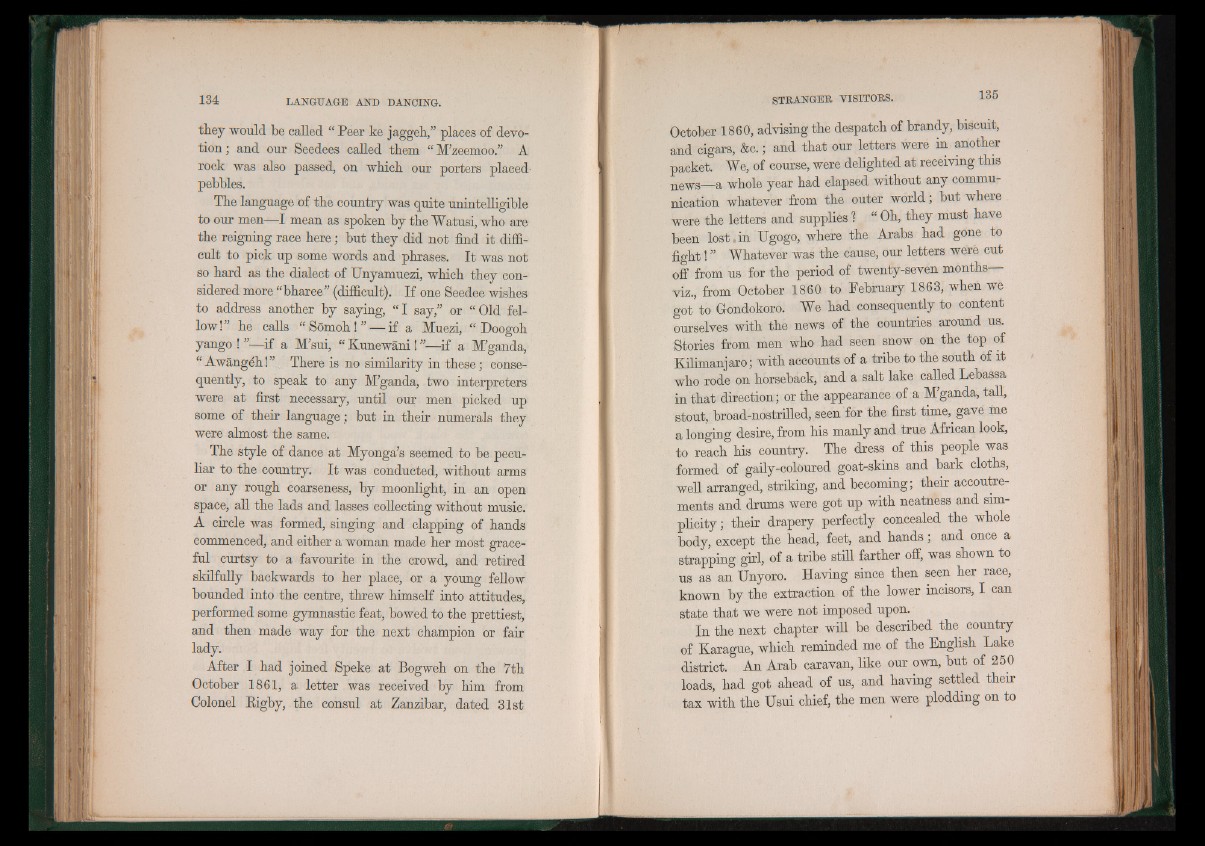
they 'would be called * Peer ke jaggeh,” places of devotion
; and our Seedees called them “M’zeemoo.” A
rock was also passed, on which our porters placed-
pebbles.
The language of the country was quite unintelligible
to our men—I mean as spoken by the Watusi, who are
the reigning race here; but they did not find it difficult
to pick up some words and phrases. It was not
so hard as the dialect of Unyamuezi, which they considered
more “bharee” (difficult). If one Seedee wishes
to address another by saying, “ I say,” or “ Old fellow!”
he calls “ Somoh ! ” — if a Muezi, “ Doogoh
yango ! ”—if a M’sui, “ Kunewani ! ”—if a M’ganda,
“ Awangdh! ” There is no similarity in. these ; consequently,
to speak to any M’ganda, two interpreters
were at first necessary, until our men picked up
some of their language; but in their numerals they
were almost the same.
The style of dance at Myonga’s seemed to be peculiar
to the country. I t was conducted, without arms
or any rough coarseness, by moonlight, in an open
space, all the lads and lasses collecting without music.
A circle was formed, singing and clapping of hands
commenced, and either a woman made her most graceful
curtsy to a favourite in the crowd, and retired
skilfully backwards to her place, or a young fellow
bounded into the centre, threw himself into attitudes,
performed some gymnastic feat, bowed to the prettiest,
and then made way for the next champion or fair
lady.
After I had joined Speke at Bogweh on the 7th
October 1861, a letter was received by him from
Colonel Eigby, the consul at Zanzibar, dated 31st
October 1860, advising the despatch of brandy, biscuit,
and cigars, &c.; and that our letters were in another
packet. We, of course, were delighted at receiving this
news—a -whole year had elapsed without any communication
whatever from the outer world; but where
were the letters and supplies ? “ Oh, they must have
been lost.in Ugogo, where the Arabs had gone to
fight! ” Whatever was the cause, our letters were cut
off from us for the period of twenty-seven months—
viz., from October 186Q to February 1863, when we
got to Gondokoro. We had consequently to content
ourselves with the news of the countries around us.
Stories from men who had seen snow on the top of
Kilimanjaro; with accounts of a tribe to the south of it
who rode on horseback, and a salt lake called Lebassa
in that direction; or the appearance of a M’ganda, tall,
stout, broad-nostrilled, seen for the first time, gave me
a longing desire, from his mauly and true African look,
to reach his country. The dress of this people was
formed of gaily-coloured goat-skins and bark cloths,
well arranged, striking, and becoming; their accoutrements
and drums were got up with neatness and simplicity;
their drapery perfectly concealed the whole
body, except the head, feet, and hands; and once a
strapping girl, of a tribe still farther off, was shown to
us as an Unyoro. Having since then seen her race,
known by the extraction of the lower incisors, I can
state that we were not imposed upon.
In the next chapter will be described the country
of Karague, which reminded me of the English Lake
district. An Arab caravan, like our own, but of 250
loads, had got ahead of us, and having settled then
tax with the Usui chief, the men were plodding on to